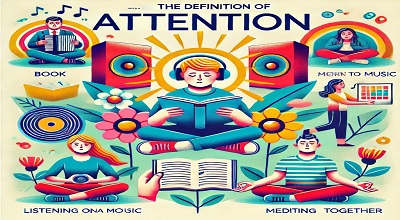Definition of Attention
Attention, a fundamental cognitive process, is the act of focusing selectively on one aspect of the environment while ignoring other things. This selective process is essential for our everyday functioning, allowing us to navigate the world effectively.
Types of Attention
- Focused Attention: This is the ability to focus on one specific task or stimulus for a prolonged period. For example, reading a book requires focused attention to comprehend and engage with the content.
- Sustained Attentions: This involves maintaining attentions on a repetitive or boring task over time. An example is a student listening to a long lecture.
- Selective Attention: This type involves focusing on one task while ignoring others. For instance, concentrating on a conversation in a noisy environment.
- Alternating Attentions: This refers to the ability to switch focus between tasks that require different cognitive demands. An example is a chef monitoring multiple dishes while cooking.
- Divided Attentions: This is multitasking, or attending to multiple things simultaneously. For example, texting while watching TV.
Importance of Attention in Everyday Life
- Learning: Effective learning requires the ability to pay attentions. Whether it’s in a classroom setting or during self-study, attention is crucial for absorbing and retaining information.
- Safety: Attentions plays a vital role in safety. For instance, paying attention while driving is crucial to avoiding accidents.
- Social Interaction: In social contexts, paying attention to others’ words and body language is key to effective communication and forming relationships.
- Work Productivity: In the workplace, attentions to detail can lead to higher quality work and fewer errors.
Factors Influencing Attention
- External Factors: These include environmental stimuli like noise or visual attractions. For instance, it’s harder to concentrate in a noisy cafe compared to a quiet library.
- Internal Factors: These are related to individual differences, such as fatigue, stress, or interest levels. Someone who is interested in a topic is more likely to pay attentions to it.
- Psychological Disorders: Conditions like ADHD (Attentions Deficit Hyperactivity Disorder) can significantly impact one’s ability to pay attentions.
Strategies to Improve Attention
- Mindfulness and Meditation: These practices can enhance the ability to focus and sustain attentions.
- Time Management Techniques: Methods like the Pomodoro Technique help in maintaining sustained attentions by breaking work into intervals with short breaks.
- Creating a Conducive Environment: Minimizing distractions in the environment can help improve attentions.
- Physical Activity: Regular exercise has been shown to improve concentration and cognitive function.
Conclusion
Attention is a complex and dynamic process that is integral to virtually all aspects of human behavior. Understanding the types of attentions and the factors that influence it can help in developing strategies to improve it. This improvement is crucial for better learning, safety, social interaction, and productivity in our daily lives.
